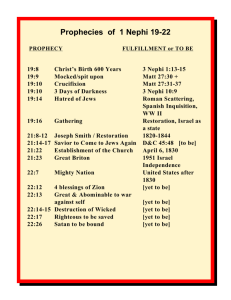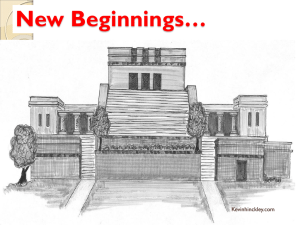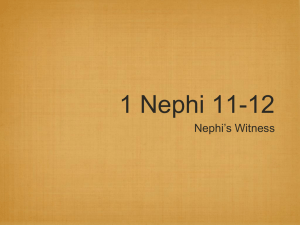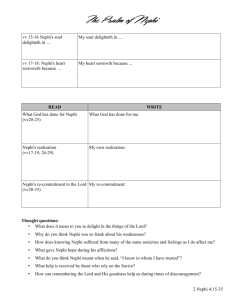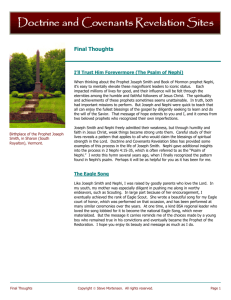3 Nephi 12-14
advertisement
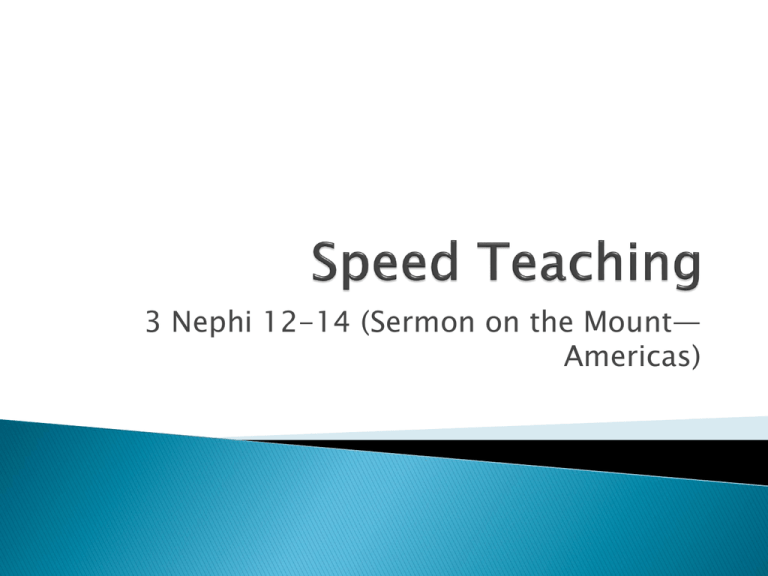
3 Nephi 12-14 (Sermon on the Mount— Americas) Everybody needs to be seated directly across from another person. You will be given four minutes to “teach one another” the scripture block you have been assigned. The first minute you are to study the scripture block and the last three minutes are for sharing insights, understanding, experiences that are related to the scripture block, etc… Of this sermon, PresidentHarold B. Lee said: “Christ came not only into the world to make an atonement for the sins of mankind but to set an example before the world of the standard of perfection of God’s law and of obedience to the Father. In his Sermon on the Mount the Master has given us somewhat of a revelation of his own character, which was perfect, or what might be said to be ‘an autobiography, every syllable of which he had written down in deeds,’ and in so doing has given us a blueprint for our own lives” (Decisions for Successful Living [1973], 55–56). 3 Nephi 12:13 3 Nephi 12:21-25, 38-41 3 Nephi 12:27-30 3 Nephi 12: 43-45, 48 3 Nephi 13:1-4 3 Nephi 13:19-24 3 Nephi 13:31-34 3 Nephi 14:1-5 3 Nephi 14:7-12 3 Nephi 14:15-23 3 Nephi 14:24-27 “The daily taking up of the cross means daily denying ourselves the appetites of the flesh. “By emulating the Master, who endured temptations but ‘gave no heed unto them,’ we, too, can live in a world filled with temptations ‘such as [are] common to man’ (1 Corinthians 10:13). Of course Jesus noticed the tremendous temptations that came to Him, but He did not process and reprocess them. Instead, He rejected them promptly. If we entertain temptations, soon they begin entertaining us! Turning these unwanted lodgers away at the doorstep of the mind is one way of giving ‘no heed.’ Besides, these would-be lodgers are actually barbarians who, if admitted, can be evicted only with great trauma” (in Neal A Maxwell, Ensign, May 1987, 71). Ten days ago, I had a beautiful and touching experience in the Salt Lake Temple, the building immediately to the east of this tabernacle. There in that holy sanctuary I had the privilege of sealing in marriage, in two separate but consecutive ceremonies, two beautiful young women who are twins, each to a handsome and able young man of her choice. That evening, a double wedding reception was held where hundreds of friends came to express their love and good wishes. Mothers often shed tears at a wedding ceremony. Sisters also, and sometimes fathers. Seldom do grandparents show any emotion. But these beautiful girls were my own granddaughters, and I must confess that this old grandfather choked up and had a difficult time. I don’t understand why. Certainly it was a happy occasion, a fulfillment of dreams and prayers. Perhaps my tears were really an expression of joy and of gratitude to God for these lovely brides and their handsome young husbands. In sacred promises, they pledged their love and loyalty one to another for time and all eternity. Of course, all in marriage is not bliss. Years ago I clipped these words from a column written by Jenkins Lloyd Jones: “There seems to be a superstition among many thousands of our young who hold hands and smooch in the drive-ins that marriage is a cottage surrounded by perpetual hollyhocks to which a perpetually young and handsome husband comes home to a perpetually young and ravishing wife. When the hollyhocks wither and boredom and bills appear the divorce courts are jammed. … “Anyone who imagines that bliss is normal is going to waste a lot of time running around shouting that he has been robbed.” (Deseret News, 12 June 1973, p. A4.) Some of you within the sound of my voice could recount family sorrows in your own experience. But among the greatest of tragedies, and I think the most common, is divorce. It has become as a great scourge. The most recent issue of the World Almanac says that in the United States during the twelve months ending with March 1990, an estimated 2,423,000 couples married. During this same period, an estimated 1,177,000 couples divorced. (See The World Almanac and Book of Facts, 1991, New York: World Almanac, 1990, p. 834.) This means that in the United States almost one divorce occurred for every two marriages. I am satisfied that a happy marriage is not so much a matter of romance as it is an anxious concern for the comfort and well-being of one’s companion. Selfishness so often is the basis of money problems, which are a very serious and real factor affecting the stability of family life. Selfishness is at the root of adultery, the breaking of solemn and sacred covenants to satisfy selfish lust. Selfishness is the antithesis of love. It is a cankering expression of greed. It destroys self-discipline. It obliterates loyalty. It tears up sacred covenants. It afflicts both men and women. Too many who come to marriage have been coddled and spoiled and somehow led to feel that everything must be precisely right at all times, that life is a series of entertainments, that appetites are to be satisfied without regard to principle. How tragic the consequences of such hollow and unreasonable thinking! There is a remedy for all of this. It is not found in divorce. It is found in the gospel of the Son of God. He it was who said, “What therefore God hath joined together, let not man put asunder.” (Matt. 19:6.) The remedy for most marriage stress is not in divorce. It is in repentance. It is not in separation. It is in simple integrity that leads a man to square up his shoulders and meet his obligations. It is found in the Golden Rule. Marriage is beautiful when beauty is looked for and cultivated. It can be ugly and uncomfortable when one is looking for faults and is blinded to virtue. As Edgar A. Guest once remarked, “It takes a heap o’ livin’ in a house t’ make it home.” (“Home,” in Collected Verse of Edgar A. Guest, Chicago: Reilly and Lee Co., 1934, p. 12.) That is true. I can show you throughout this church hundreds of thousands of families who make it work with love and peace, discipline and honesty, concern and unselfishness. There must be recognition on the part of both husband and wife of the solemnity and sanctity of marriage and of the God-given design behind it. There must be a willingness to overlook small faults, to forgive, and then to forget. There must be a holding of one’s tongue. Temper is a vicious and corrosive thing that destroys affection and casts out love. There must be selfdiscipline that constrains against abuse of wife and children and self. There must be the Spirit of God, invited and worked for, nurtured and strengthened. There must be recognition of the fact that each is a child of God—father, mother, son, and daughter, each with a divine birthright—and also recognition of the fact that when we offend one of these, we offend our Father in Heaven. There may be now and again a legitimate cause for divorce. I am not one to say that it is never justified. But I say without hesitation that this plague among us, which seems to be growing everywhere, is not of God, but rather is the work of the adversary of righteousness and peace and truth. The strength of the nations lies in the homes of the people. God is the designer of the family. He intended that the greatest of happiness, the most satisfying aspects of life, the deepest joys should come in our associations together and our concerns one for another as fathers and mothers and children.(Gordon B. Hinckley, “What God Hath Joined Together,” Ensign, May 1991, 71). 1. You say to your son “I don’t want you to hang out with him. He’s trouble.” Your son responds “Quit judging.” 2. Your neighbor is arrested for embezzling 100,000 dollars from the bank where he works and you bank. You say to your wife “he’s going to hell.” 3. A student in your religion class misses a ton of days because he’s “sick”. 4. You feel like when you go to church everybody in the ward judges you. 5. Your friends want you to go to with them to smoke weed. 6. The school where you attend won’t let you wear certain clothes or hair styles. Isn’t that a type of judgment? 7. You live in California and voted yes on Prop 8. Your neighbor tells you that you are a judgmental bigot. I have been puzzled that some scriptures command us not to judge and others instruct us that we should judge and even tell us how to do it. But as I have studied these passages I have become convinced that these seemingly contradictory directions are consistent when we view them with the perspective of eternity. The key is to understand that there are two kinds of judging: final judgments, which we are forbidden to make, and intermediate judgments, which we are directed to make, but upon righteous principles. I will speak about gospel judging. (Dallin H. Oaks, “‘Judge Not’ and Judging,” Ensign, Aug 1999, 7). “Couldn’t you imagine that if a family purposely built their house on sand, their neighbors would come running to their aid, would probably warn them and try to persuade them not to make such a critical error? But we are actually witnessing this tragic mistake taking place. Some houses are being built on sand” (David B. Haight, “A Foundation Whereon Men Cannot Fall,” Ensign, Jul 1972, 107).
